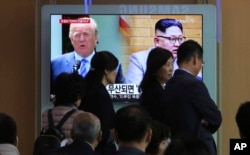South Korean President Moon Jae-in was more optimistic than U.S. President Donald Trump about prospects for the U.S.- North Korea nuclear summit, following their meeting in Washington on Tuesday.
President Trump said there was a "substantial chance" his June 12 meeting with North Korean leader Kim Jong Un in Singapore would not take place over concerns that the North is not prepared to end its nuclear program.
“I don't want to waste a lot of time and I'm sure he (Kim Jong Un) doesn't want to waste a lot of time,” said President Trump.
But President Moon, appealing to Trump’s ambition to a negotiate an unprecedented peace agreement to end the North’s threatening nuclear program, was both flattering and reassuring in his comments.
"I have every confidence that President Trump will be able to achieve a historic feat of making the upcoming U.S.-North Korea summit successful, and end the Korean War that had been lasting for the past 65 years,” said President Moon.
Denuclearization gap
Moon had been instrumental in creating favorable conditions for the U.S. –North Korea summit by getting Kim to make a broad commitment to denuclearization at the inter-Korean talks held in April. But recently Pyongyang threatened to pull out of the summit with the U.S. over hardline comments made by U.S. National Security Adviser John Bolton demanding that North Korea unilaterally give up its entire nuclear, ballistic missile and biological weapons programs before receiving any concessions.
The Kim government has called for a step-by-step denuclearization process that would link early sanctions relief and other concessions to specific measures taken, such as a partial reduction in nuclear warheads or the dismantlement of intercontinental ballistic missiles that pose a direct threat to the U.S. mainland.
Many skeptics who have seen the repressive North Korean government renege on past nuclear agreements are unconvinced it is prepared this time to give up its weapons of mass destruction, and allow in outside inspectors to oversee the process.
“I cannot see them abandoning their nuclear weapons without changing their ideological orientation. And I’m not seeing any sign of that,” said East Asia security analyst Daniel Pinkston, with Troy University in Seoul.
However proponents for a nuclear agreement argue that conditions this time around are right for a deal. They say Trump’s “maximum pressure” campaign, which led international efforts to impose sanctions banning 90 percent of the North’s trade and that threatened U.S. military force, has been effective in forcing Kim to offer significant concessions.
President Moon tried to reassure Trump that Kim is serous about giving up his nuclear deterrent, if his security and economic concerns are addressed.
“President Moon said there is no need to question the North's intention to participate in the U.S.-North Korea summit, and emphasized the need for the U.S. and South Korea to agree on specifics regarding North Korea's denuclearization,” said Yoon Young-Chan, a South Korea presidential spokesman.
Trump expressed a bit more flexibility about the U.S. position following his meeting with Moon, saying only that there are “certain conditions” that must be met for the nuclear summit with Kim, and that if a deal is reached, the U.S. would guarantee the safety and prosperity of the North Korean leader.
North Korea
North Korea seemed to express its anger at the U.S. by punishing South Korea, in canceling recent working level inter-Korean talks, and blocking South Korean journalists from entering the country to cover the closing of the country’s nuclear site.
“Clearly they did not want to break off talks with United States, which is very valuable for them. The only leverage they have was in pressuring South Korea,” said Go Myong-Hyun, a North Korea analyst at the Asan Institute for Policy Studies in Seoul.
But on Wednesday after Trump and Moon’s meeting, Pyongyang allowed selected South Korean journalists to join a group of reporters from the U.S., China, Russia, and Britain that are already in North Korea to cover the closing this week of the Punggye-ri test site, where the country’s six underground nuclear tests were conducted.
Seoul also indicated that inter-Korean talks would likely resume after U.S.-South Korea joint military exercises end later this week. North Korea suddenly cancelled talks with the South last week and blamed the annual military exercises for undermining recent peaceful progress made at the Moon-Kim summit.
Lee Yoon-jee in Seoul contributed to this report.






